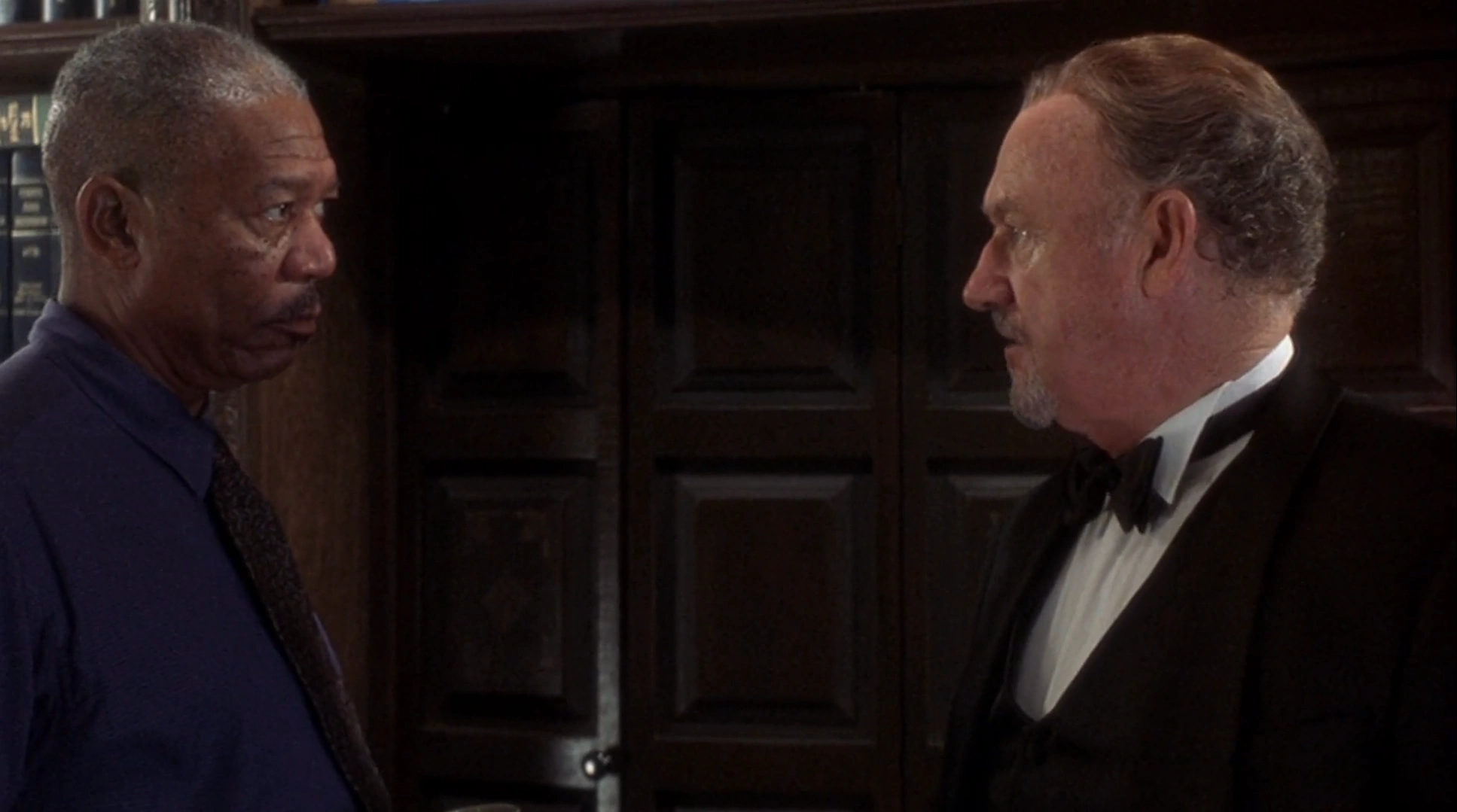Henry Hearst (Gene Hackman) is a wealthy lawyer in Puerto Rico who's about to give a big speech at a fancy fundraising party. The day before, he found the body of a young girl who had been raped and murdered. The police call him in for routine questioning about finding the body.
But once he's at the police station, Captain Victor Benezet (Morgan Freeman) and Detective Owens start asking him harder questions. They notice his story keeps changing - small details don't match up. Henry realizes they don't just think he found the body, they think he killed the girl. And not just her, but another girl who was murdered a few days earlier too.
At first Henry isn't too worried because he knows he's innocent. But as the questioning goes on for hours, more and more evidence starts piling up against him. They find out he visits prostitutes and looks at porn websites with very young women. His wife Chantal tells police that she's suspicious of him too - she saw him being friendly with her 13-year-old niece and thought it was creepy.
Then the biggest blow comes when police search his house and find photographs of both murdered girls in his darkroom. Henry is shocked and says he can't believe his wife would go this far to frame him.
Feeling completely betrayed and broken down after hours of interrogation, Henry finally confesses to both murders. He gives detailed descriptions of how he killed the girls - but these details are exactly what the police had already told him during questioning.
Just as he's confessing, another detective bursts in with news: they caught the real killer in the act of attacking another girl. Henry is innocent and free to go.
But the damage is done. His wife destroyed their marriage with her suspicions and by planting evidence. Henry can't forgive her betrayal and walks away from her into the crowd, completely alone.
Henry never committed any crimes. His wife Chantal was jealous and paranoid, convinced he was a predator because she saw him being nice to her young niece. She planted the photographs in his darkroom to frame him. Under the pressure of interrogation and the shock of his wife's betrayal, Henry had a mental breakdown and confessed to crimes he didn't commit, using details the police had fed him during questioning.
The movie is really about how innocent people can be pressured into false confessions and how jealousy and suspicion can destroy relationships and lives.
This is the kind of movie that makes you think about how easily innocent people can be railroaded by the system. Victor Benezet (Morgan Freeman) isn't really investigating – he's decided Henry is guilty from the start and is just trying to prove it. It's particularly relevant today when we know more about how false confessions happen and how bias can easily corrupt investigations.
Gene Hackman absolutely nails his performance as Henry Hearst – you can see him transform from a confident wealthy lawyer into a completely broken man over the course of the film. The way he conveys that gradual mental breakdown is incredible. Morgan Freeman brings his usual commanding presence as Captain Benezet, playing the relentless interrogator with just the right mix of authority and manipulation.
Monica Bellucci's Chantal is this deeply jealous, paranoid woman who's convinced herself her husband is a predator based on basically nothing. She's so consumed by her own insecurities that she actually plants evidence to frame him. The betrayal is devastating to watch, but honestly, when Henry walks away from her at the end, I felt relieved for him. She had been emotionally abusing him for years with her constant suspicions and jealousy.
The interrogation scenes are masterfully done. Most of the movie takes place in one room, but the tension never lets up. Thomas Jane as Detective Owens brings this aggressive, almost sadistic energy that contrasts well with Freeman's more calculated approach. Watching these two systematically break down an innocent man is both fascinating and horrifying. Hackman's performance during the confession scene is heartbreaking – he's not confessing because he's guilty, he's confessing because he literally can't take the psychological torture anymore.
One thing that disappointed me about the ending was how they handled the real killer reveal. After all this intense psychological drama and complex character development, the actual murderer is just mentioned in passing – some random guy they caught "in the act" but we never see him or learn anything about him. It feels like a missed opportunity to provide real closure. The ending is deliberately open-ended, which works for the character study aspect, but as a thriller it left me wanting more concrete answers. Who was this person? How did he select his victims? Was there any connection to Henry or the other characters? This film builds up this elaborate mystery for nothing. While I understand they wanted to focus on Henry's psychological journey rather than create a traditional who-dun-it, it still felt unsatisfying to have the real perpetrator remain completely anonymous and unexplored. A brief scene showing his capture or even just more details about who he was would have made the resolution feel more complete.
This would explain why it didn't do well at the box office, earning approximately $1.38 million with an estimated budget of $25 million, many people felt this movie was dragged out and criticized the ending to be easily predictable.
The ending is not so satisfying, Henry loses everything – his reputation, his marriage, his sense of self. But he also gets free from a wife who never trusted him and was actively working to destroy him. When he walks away from Chantal in that final scene, it's like he's finally escaping years of emotional abuse. At least he's no longer trapped in that toxic relationship. Sometimes losing everything is the only way to truly start over.
Watch on Apple TV or Amazon Prime

